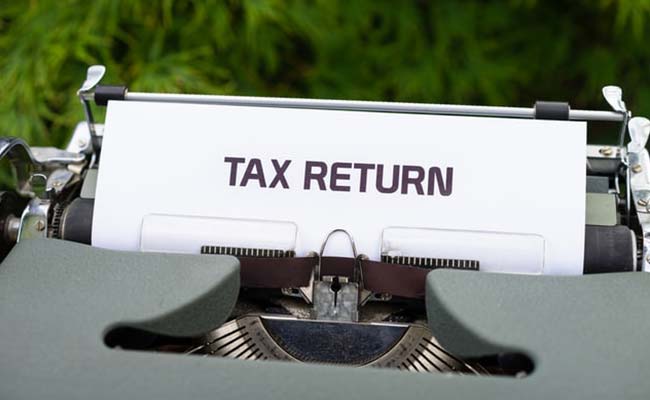Do foreigners need to pay tax in Thailand? Yes, but only under certain circumstances – which I will explain here.
You've probably seen lots of speculation online regarding the changes to tax policy on foreign income remittance to Thailand. Many expats are misinformed but understandably worried about how this will impact life in Thailand.
To help separate the truth from the speculation, I have enlisted the help of tax professionals to provide accurate information on this subject.
Should you need further advice, TTL readers can get a free Thai tax guide and a complimentary tax consultation from Expat Thai Thailand at this link.

Contents
- Tax Residency Rule
- Previous Tax Rule
- New Tax Rule
- Why the Change in Law for Expats?
- Who Has to File?
- What Is Taxable (Assessable) Income?
- What Is Not Taxable (Assessable) Income?
- Eligible Tax Deductions
- Tax Credits
- Double Taxation Agreements (DTA)
- The Filing System
- Enforcement
- Webinar with Expat Thailand (professional advice)
The Thai Tax Residency Rule
To understand whether or not the foreigner income tax rule affects you, let's first define a resident, or rather, a tax resident in Thailand. In Thai law, a tax resident is defined as an individual who stays in Thailand for a period or periods aggregating 180 days or more in any tax year.
If you fall outside of this rule, you need not worry about, as the change won't affect you. If you do fall into this bracket, please read on.
The Previous Tax Rule
As it stands, the assessable income received by a Thai tax resident through employment, an overseas business, or property located abroad would be subject to Thai personal income tax only if the earnings were remitted to Thailand within the same tax year.
For example:
Sarah lives in Thailand for 180+ days per year, and works as a consultant for an international company based in the United States.
Under the previous tax regulations, if Sarah earned $50,000 from her overseas job in January 2024 but choose not to transfer the funds to Thailand until February 2025 , she was not required to pay Thai personal income tax on that income for the year 2024.
Under the new law, Sarah would now be required to pay personal income tax on that income.
The New Tax Rule
Under the rule, which started January 1, 2024, foreign-sourced income over 120,000 THB (or 220,000 THB for married couples) repatriated to Thailand will be eligible for Thai income tax, regardless of the tax year in which the income was earned.
Here are some further examples provided by the revenue department:
- Mr. A is in Thailand every day from January to December 2025 for a total of 366 days. Mr. A is deemed a resident of Thailand in tax year 2025.
- Miss K is in Thailand during odd months in 2025 for a total of 184 days. Ms. K is deemed a resident of Thailand in tax year 2025.
- Mr. C was in Thailand from January to December 2025 for a total of 179 days. Mr. C is not deemed a resident of Thailand in tax year 2025.
- Mrs. D has been in Thailand continuously for a total of 250 days with the first 100 days being in 2024 and the last 150 days being in 2025. Therefore, Mrs. D is not deemed a resident of Thailand in both tax year 2024 and tax year 2025 because Mrs. D was in Thailand for less than 180 days in both tax years.
Income Earned Before 2024
What about income earned before 2024 but brought into Thailand in 2024, will it be subjected to taxation?
The revenue department says:
Foreign-sourced income earned before January 1, 2024, won't need to be declared in Thai tax returns, irrespective of when it’s brought into the country.
Income Earned Prior to Living/Retiring in Thailand
There has been much speculation on how accumulated income prior to living in Thailand will be assessed. For example, a person lives and works in a foreign country and later retires to Thailand with his/her overseas earned income. Will such a person have to pay taxes on these earnings?
The revenue department says:
No. This is because the said accumulated earnings came from assessable income that occurred in the tax year in which the person stayed in Thailand for less than 180 days. Example: Mrs. D. is of Thai nationality and has been living in China since 2007. But in 2024, Mrs. D. wants to travel back to live in Thailand permanently, so she brings back her accumulated earnings from working in China. As such, Mrs. D. is not obliged to pay any personal income tax on money brought into Thailand in 2024 because the said accumulated money comes from assessable income that occurred in the tax year in which Mrs. D. was not a resident of Thailand.
Why Is Thailand Changing the Law for Expats?
It is all about raising money, not about targeting expats.
One assumes the legislative changes are aimed at wealthy Thai citizens with foreign income sources. Unfortunately, foreigners with residence permits or long-stay visas have been caught in the cross-fire, so to speak.
As Prime Minister Srettha Thavisin explained quite bluntly:
You should pay tax on income you earn, no matter how you earn it.
Who Has to File a Tax Return in Thailand?
- Anyone who remits (transfers) assets into Thailand that are ‘assessable income': pension income, investment gains, property rental income, property sale gains, dividends, etc.
- If the amount is greater than THB220,000 as a joint married couple or THB120,000 as an individual.
- Regardless if tax is paid in another jurisdiction, if you have assessable income over the above threshold you have to file a Thai tax return. It doesn't mean you will have tax to pay, though, as you may receive tax credits.
- If you are remitting non-taxable assets (like cash from previous tax years, or inheritance in cash) then you don't have to add this to your tax return and don't have to file if that is your only source.
- It isn't a requirement for Visa renewal to have a tax ID and file a tax return, as some people don't have to file or get a Tax ID.
What Is Taxable (Assessable) Income?
- Direct and indirect financial transfers, ATM withdrawals and credit card spending, if sourced from overseas, are considered remitted and therefore assessable income for tax purposes.
- Cash or assets physically carried across the border, or through the airport are also classed as remittance and should be declared on the tax return.
Pension Taxation
State pensions are assessable income. That doesn't mean you will have to pay tax, it means that you will need to declare payments if the amount goes over the tax allowance. It may be the case that, due to deductions, or tax already paid under a DTA, that you receive a credit and do not pay tax.
US Social Security
US social security is not considered assessable income.
What Is Not Taxable (Assessable) Income?
- Any asset or income that isn't transferred or spent in Thailand if left overseas. Tax is only on remittance, not global taxation on worldwide assets.
- Remittance of income from previous tax years when not a Thai-tax resident.
- Remittance of any cash in the bank as of 31st December 2023 (as per the November announcement).
- Remittance of original capital (from investments, property, etc).
- Inheritance.
- Gifts (potentially taxable under gift tax rules).
- Loans.
Eligible Tax Deductions
Thailand offers personal and family allowances which can significantly reduce taxable income. These allowances are available for the taxpayer, spouse (if not filing jointly), and children (subject to specific conditions).
- Deductions can be claimed for medical expenses, including health insurance premiums. There are caps on the amount that can be claimed, and specific criteria must be met.
- Interest paid on a mortgage in your name for a Thai property can be claimed as a deduction.
- Expenses for your own or your dependents’ education in Thailand are deductible.
- Donations to approved charities and religious institutions in Thailand are tax-deductible.
- Contributions to approved retirement funds are eligible for tax deductions. There are annual limits on the amount that can be deducted.
Tax Credits
The tax credit system means you can potentially offset some of all of your Thailand personal income tax with tax already paid. You will need to consider the following:
- If a DTA allows you to be taxed in Thailand on remittance, then you need to calculate the tax already paid.
- You will need a tax certificate showing the taxed paid in the other jurisdiction.
- The credit is submitted with the tax return.
- In most cases, a tax credit calculation and assessment is needed due to differing tax years.
Double Taxation Agreements (DTA)
A double tax treaty, also known as a tax treaty or a bilateral tax treaty, is an international agreement between two countries designed to address and mitigate the issue of double taxation for individuals and businesses with economic activities or income sources in both countries. The main purposes of double tax treaties are:
- Avoidance of Double Taxation: Double taxation occurs when a taxpayer is liable to pay taxes on the same income or capital in both their home country (where they are a resident) and in a foreign country (where the income or capital is generated). Double tax treaties provide mechanisms to prevent or reduce this double taxation.
- Prevention of Tax Evasion: These treaties also aim to prevent tax evasion by requiring the exchange of information between the two countries, which helps tax authorities in each country verify income and enforce tax laws.
Thailand has double-tax treaties with 61 countries.
The revenue department has stated:
If you are deemed a a tax resident of Thailand (staying in Thailand for 180 days or more), the tax paid abroad can be credited against the tax paid in Thailand in the tax year that assessable income was brought into Thailand according to the provisions of the Double Tax Treaty to which Thailand is a contracting party.
The double tax position depends on each country's DTA agreement with Thailand and how specific assets are treated. Each DTA is a separate International Treaty, with different provisions, so it is advisable to check the precise terms that apply in your situation.
Note: Regardless of the tax treaty, you may still have to declare the income in Thailand as part of your tax return, and, as stated by the revenue department, you will be credited for the tax already paid.
Common Misconceptions of DTAs
- A DTA in place means that individuals are protected from being taxed in Thailand (false).
- Being taxed in another country on assets already exempts the from taxation in Thailand (false).
- A DTA in place means that nothing needs to be filed or reported as tax was paid in the other country (false).
General DTA Principles
- Check each DTA for the jurisdiction in which your assets are based.
- Look for exclusions or exemptions or special rules pertaining to that country.
- In principle, the majority of articles show that if assets are remitted to Thailand, you can use tax paid as a credit. Not in all cases though, as some assets are only taxable in Thailand and you'd have to claim back the tax in the other country.
- Use Thai personal allowances not overseas allowances when considering tax credit calculations.
How Will The Filing System Work?
If you do remit foreign sourced income to Thailand, you will need to obtain a Tax Identification Number (TIN) to file a tax return.
An online portal for tax filing exists, but it is currently available only in Thai. Efforts to include English support are being considered. However, it is best to file through a tax professional.
Essential Documents
A complete set of documents is needed for a hassle-free tax filing experience. This includes identification documents, income statements, and documentation of deductions and allowances claimed.
Specific Documents
Typically, you will need your passport, work permit (if applicable), annual income statements, receipts for allowable deductions, bank statements, and documents for any tax exemptions claimed.
Filing Deadlines
The deadlines for filing tax returns in Thailand are critical to meet to avoid penalties. The Thai tax year runs from 1 January to 31 December.
End of Year: PND90/91 personal tax returns need to be submitted within 3 months of the year-end date for paper filings and 3 months and 8 days of the year end for eFilings
Half year: PND94 personal tax return (within 3 months of the half year-end date): Individuals who have received income under section 40 (5) – (8) of the Revenue Code, with non-salary income like as income from rent, commissions, royalties, professional fees, dividends etc, have to report income earned from January to June and pay taxes with the a half-year personal income tax return (PND 94 form).
Ensure you know the exact filing deadline for the relevant tax year and mark it in your calendar.
Enforcement (Penalties for Not Filing)
One of the most common questions/comments I've seen is “How will they enforce this?” “They can't track every transaction!”
Well, they can, if they want to.
They can do this via the The OECD Common Reporting Standard (CRS).
The CRS is an internationally agreed standard for the automatic exchange of financial account information between tax authorities of different countries. Developed by the Organisation for Economic Co-operation and Development (OECD), the CRS aims to combat tax evasion and enhance tax transparency on a global scale.
Under the CRS, financial institutions, such as banks, investment funds, and insurance companies, are required to collect and report information on financial accounts held by foreign tax residents to their respective tax authorities. This information includes details such as the account holder's name, address, tax identification number, account balance, and income earned.
Tax authorities then exchange this information with the tax authorities of other participating countries on an annual basis, allowing for greater transparency and cooperation in tackling cross-border tax evasion. The CRS is based on the principle of automatic exchange of information (AEOI), which ensures that tax authorities have access to comprehensive and up-to-date information on the financial activities of their residents held abroad.
Since its introduction, the CRS has been adopted by over 120 jurisdictions worldwide, including major financial centers and tax havens.
Penalties:
- Penalties for failing to file tax returns up to 200% of the assessed amount of tax that is payable.
- Surcharge of 1.5% for each month since the tax was owed.
- Penalties intentionally avoiding / evading payment of tax by failing to file a tax return can be punished by imprisonment for a term of up to 1 year and / or fine up to 200,000 THB.
Get Further Information on Tax Policy Changes
If you're unsure how these tax changes will affect you, and want clarification on areas such as Double Taxation Agreements (DTAs), available deductions and credits, and how to file in Thailand, TTL readers can get a free Thai tax guide and a complimentary tax consultation.
+ You can register your interest at this link.
Disclaimer:
Please note that I am not a tax advisor, and none of the information in this article constitutes financial advice. The information detailed on this page is based on information provided by the Thai Revenue Department and Expat Tax Thailand.
If you have any questions or comments, please feel free to drop them below.
Tips for a Better Life in Thailand
Get Good Health Insurance:
Start with a quick quote here from Cigna. Then you can compare it to other companies.
Send Money to Thailand:
If you are sending money to your loved one, or your own Thai bank account, try Wise here. It is fast and cheap. Me and the majority of my readers are using it.
Improve Your Thai Skills:
Learning Thai makes life easier, and way more fun. I use Thaipod101. Get a free account by clicking here. It is really easy to use.
Last Updated on



Preston says
Sep 30, 2024 at 3:59 pm
Preston says
Sep 30, 2024 at 6:01 am
Mike Parker says
Oct 01, 2024 at 11:57 am
Preston says
Oct 01, 2024 at 5:16 pm
Michael says
Sep 29, 2024 at 4:57 pm
Alan says
There's another point, various agencies say that the Australian Old Age Pension is totally tax exempt by Australian Tax law, and that extends to any country where there is a double tax agreement.
For Aussies who have their Old Age Pension remitted direct from the Australian Gov't agency (Centrelink - not from an Aussie bank) to a Thai bank it seems that there's no Thai tax involved (remembering that Thai Tax laws allowances for people at 80 years old (and not submitting a joint tax return with Thai wife o other income, and the foreigner has no other income anywhere the result is no tax due to the Thai Revenue Department and that's regardless of six months or any period of residency.
And in my case I'm a Thai Permanent Resident of Thailand (now 27 years) but my understanding is that holding Thai PR has no bearing on Thai personal tax.
Sep 30, 2024 at 3:16 am